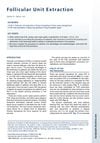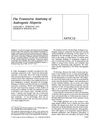 8 citations,
January 2016 in “European Journal of Plastic Surgery”
8 citations,
January 2016 in “European Journal of Plastic Surgery” PRGF treatment is safer and more effective for hair loss than topical minoxidil.
June 2022 in “Dermatologic Therapy” Oral minoxidil and growth factors improved hair density and thickness in a girl with hereditary hair loss.
 3 citations,
January 2021 in “Plastic and Aesthetic Research”
3 citations,
January 2021 in “Plastic and Aesthetic Research” Hair loss reduces hair thickness and coverage, but drug treatments mainly revive dormant hairs rather than reverse thinning; patients often undervalue their hair loss severity.
[object Object]  3 citations,
February 2008 in “Basic and clinical dermatology”
3 citations,
February 2008 in “Basic and clinical dermatology” Telogen Effluvium is a hair loss condition where treatment involves identifying and managing its triggers.
 1 citations,
March 2023 in “Frontiers in Medicine”
1 citations,
March 2023 in “Frontiers in Medicine” Topical prostaglandin analogs may help with hair growth but more research is needed.
 290 citations,
December 2017 in “Journal of The American Academy of Dermatology”
290 citations,
December 2017 in “Journal of The American Academy of Dermatology” Alopecia areata is an autoimmune condition causing hair loss, influenced by genetics, stress, and diet, and may be prevented by a high soy oil diet.
 41 citations,
August 2013 in “Facial Plastic Surgery Clinics of North America”
41 citations,
August 2013 in “Facial Plastic Surgery Clinics of North America” FUE provides minimal scarring and quick recovery in hair transplantation, and surgeons not using it may lag in technology.
 12 citations,
October 1996 in “Dermatologic Clinics”
12 citations,
October 1996 in “Dermatologic Clinics” A simplified method was introduced to diagnose most hair loss types by examining the patient's history and scalp, with some cases needing further tests.

PRP can improve hair growth in androgenetic alopecia, but results vary.
 October 2024 in “Cosmetics”
October 2024 in “Cosmetics” Afro-textured hair needs personalized care due to its unique genetic traits.
 18 citations,
March 2022 in “Drug design, development and therapy”
18 citations,
March 2022 in “Drug design, development and therapy” Platelet-rich plasma (PRP) may help with various hair loss types, but more research is needed to find the best use method.
 8 citations,
October 2022 in “Regenerative Therapy”
8 citations,
October 2022 in “Regenerative Therapy” New regenerative treatments for hair loss show promise but need more research for confirmation.
 4 citations,
February 2014 in “Proceedings of SPIE”
4 citations,
February 2014 in “Proceedings of SPIE” Low-Level Light Therapy is effective for skin rejuvenation, wound healing, and hair growth, with mild side effects.

Stem cell therapy shows promise for treating hair loss in androgenetic alopecia.
September 2022 in “Applied sciences” Combining micro-needling, LED therapy, and growth factors with Finasteride® significantly improves hair growth.

Topical minoxidil helps treat hair loss in teens, but more research needed for safe options.
 40 citations,
August 2018 in “Skin appendage disorders”
40 citations,
August 2018 in “Skin appendage disorders” Some alternative treatments for hair loss might work, but more research is needed.
 31 citations,
January 2015 in “Journal of The American Academy of Dermatology”
31 citations,
January 2015 in “Journal of The American Academy of Dermatology” Prostaglandin F2α analogs show promise for treating certain types of hair loss but need more research for other skin conditions.
 October 2024 in “Current Issues in Molecular Biology”
October 2024 in “Current Issues in Molecular Biology” Platycladus orientalis leaf extract helps hair grow by activating certain proteins.
[object Object]  83 citations,
April 1992 in “Clinical Endocrinology”
83 citations,
April 1992 in “Clinical Endocrinology” Having enough iron improves the effectiveness of a specific hair loss treatment in women.
 42 citations,
December 1990 in “The Journal of Dermatologic Surgery and Oncology”
42 citations,
December 1990 in “The Journal of Dermatologic Surgery and Oncology” The study found that horizontal sections of scalp biopsies are better for analyzing hair loss, showing fewer hairs and more fine hairs in balding areas.
 26 citations,
March 2015 in “Phytotherapy Research”
26 citations,
March 2015 in “Phytotherapy Research” Forsythiaside-A, a natural substance, can protect against hair loss and is more effective than current treatments, potentially making it a good option for hair loss treatment.
 November 2023 in “Stem cells and cloning”
November 2023 in “Stem cells and cloning” A new treatment using stem cell-conditioned media significantly improved hair growth in people with temporary hair loss.
 18 citations,
March 2016 in “Cosmetics”
18 citations,
March 2016 in “Cosmetics” Telogen Effluvium is a condition causing excessive hair loss due to stress, illness, drugs, or hormonal changes, and can be treated with specific products or naturally resolves after 3-4 years.
 6 citations,
September 2019 in “Skin pharmacology and physiology”
6 citations,
September 2019 in “Skin pharmacology and physiology” RCS-01 therapy is safe and may improve skin structure by affecting gene expression.
 2 citations,
June 2021 in “Cosmoderma”
2 citations,
June 2021 in “Cosmoderma” Platelet-rich plasma (PRP) shows promise in skin and hair treatments but results vary with preparation methods.
 26 citations,
July 2021 in “Frontiers in Cell and Developmental Biology”
26 citations,
July 2021 in “Frontiers in Cell and Developmental Biology” The review suggests that a special cell-derived treatment shows promise for various skin conditions and hair growth but needs more research for confirmation.
 October 2024 in “Experimental Dermatology”
October 2024 in “Experimental Dermatology” The belief about hair shedding phases is likely incorrect and needs reevaluation.
 February 2024 in “Plastic and Reconstructive Surgery – Global Open”
February 2024 in “Plastic and Reconstructive Surgery – Global Open” Stem cell therapies show promise for hair regrowth in androgenetic alopecia.
 September 2023 in “Cureus”
September 2023 in “Cureus” Topical finasteride might be a good alternative for hair loss treatment with fewer side effects, but more research is needed.




























